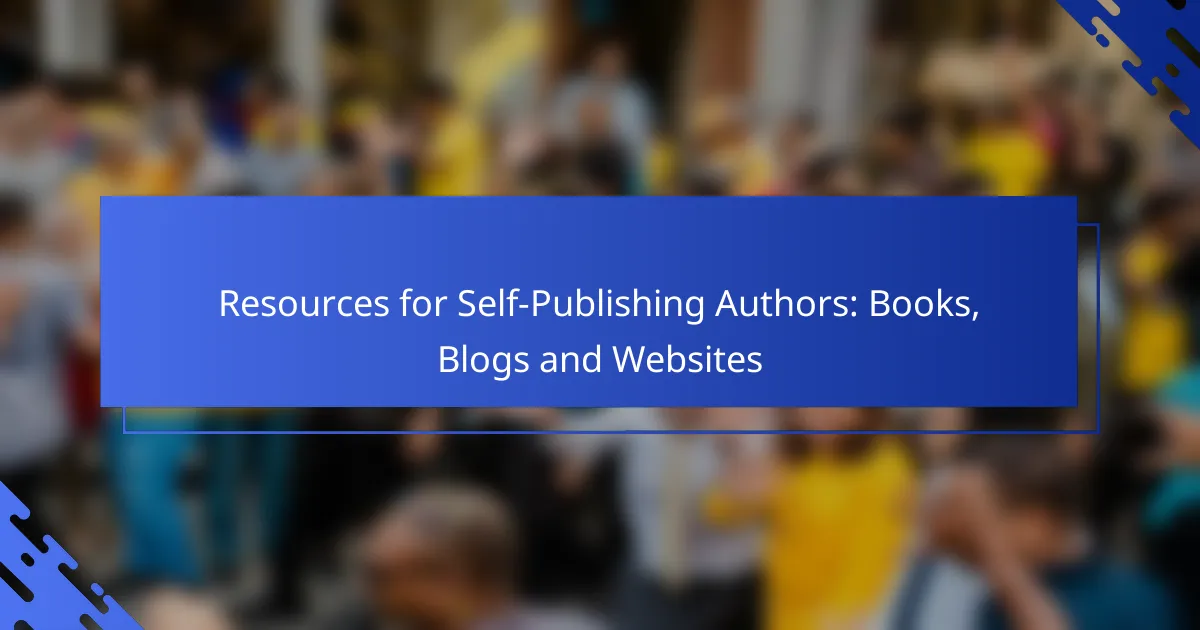Self-publishing authors require a diverse range of resources to successfully navigate their publishing journey. Essential tools include informative books that cover critical topics like marketing and distribution, as well as insightful blogs and comprehensive websites that offer tailored services and strategies for independent publishing.
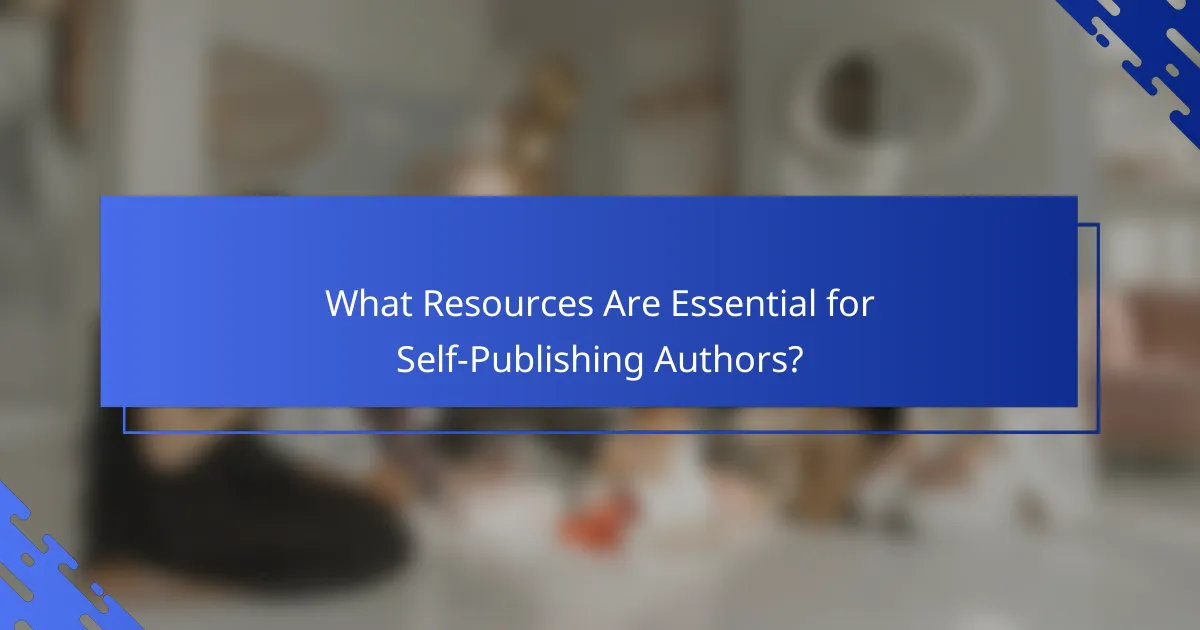
What Resources Are Essential for Self-Publishing Authors?
Self-publishing authors need a variety of resources to navigate the process effectively. Key resources include informative books, insightful blogs, and comprehensive websites that offer services tailored to self-publishing.
Books on Self-Publishing
Books on self-publishing provide in-depth knowledge and practical guidance. Titles such as “Self-Publishing for Dummies” and “The Essential Guide to Self-Publishing” cover everything from writing and editing to marketing and distribution.
When selecting books, consider those that are updated regularly to reflect current trends and technologies in the publishing industry. Look for authors who have successfully self-published their works, as their experiences can offer valuable insights.
Blogs for Self-Publishing Tips
Blogs dedicated to self-publishing offer timely tips and strategies. Popular blogs like “The Creative Penn” and “Self-Publishing Advice” provide articles on marketing, formatting, and the latest industry news.
Regularly following these blogs can keep you informed about best practices and common pitfalls. Engage with the community through comments or social media to gain additional perspectives and support.
Websites Offering Self-Publishing Services
Numerous websites provide essential services for self-publishing authors. Platforms like Amazon Kindle Direct Publishing (KDP) and IngramSpark offer tools for formatting, distribution, and print-on-demand services.
When choosing a service, consider factors such as royalty rates, distribution options, and ease of use. Some platforms may charge upfront fees, while others take a percentage of sales, so evaluate what aligns best with your financial goals.
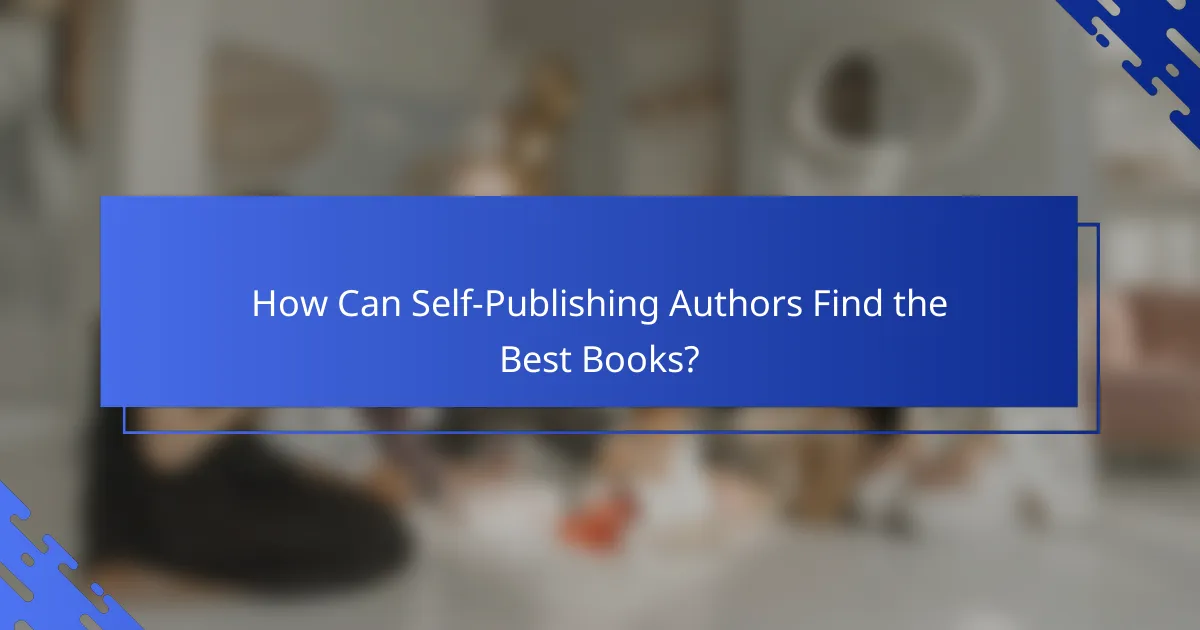
How Can Self-Publishing Authors Find the Best Books?
Self-publishing authors can find the best books by focusing on resources that provide practical insights and strategies tailored for independent publishing. Look for titles that cover essential topics such as marketing, formatting, and distribution to ensure a comprehensive understanding of the self-publishing landscape.
Top Self-Publishing Books
Some of the most recommended books for self-publishing authors include “The Self-Publishing Manual” by Dan Poynter, which offers a thorough overview of the self-publishing process, and “Let’s Get Digital” by David Gaughran, which focuses on digital publishing strategies. These titles are often praised for their actionable advice and clear guidance.
Additionally, “Self-Publishing for Dummies” provides a user-friendly approach, covering everything from writing to marketing. Authors should consider their specific needs and choose books that align with their goals, whether that’s improving writing skills or mastering book promotion.
Reviews of Self-Publishing Guides
When evaluating self-publishing guides, look for reviews that highlight the practical applications of the advice given. Websites like Goodreads and Amazon often feature user reviews that can help you gauge the effectiveness of a guide. Pay attention to comments about the clarity of instructions and the relevance of the content to current market trends.
It’s also beneficial to seek out blogs and forums where experienced self-publishing authors share their opinions on various guides. Engaging with these communities can provide insights into which resources have been most helpful and why, allowing you to make informed choices about your reading list.
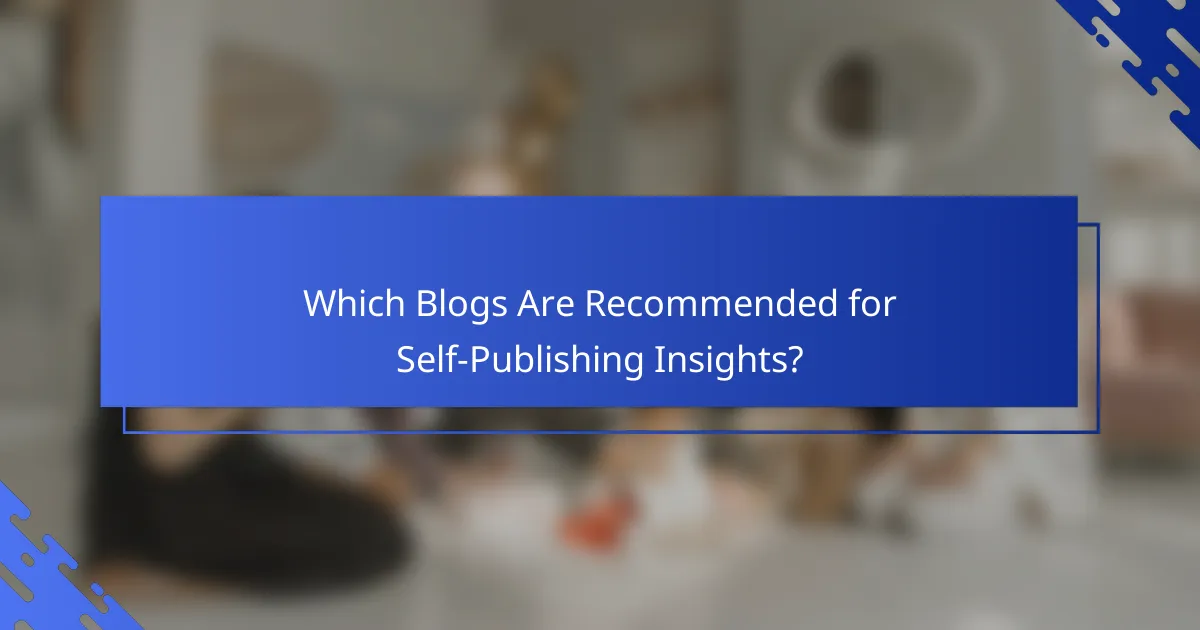
Which Blogs Are Recommended for Self-Publishing Insights?
Several blogs provide valuable insights for self-publishing authors, covering everything from marketing strategies to writing tips. These resources can help authors navigate the complexities of publishing their work independently.
Popular Self-Publishing Blogs
Some of the most popular self-publishing blogs include The Creative Penn, Self-Publishing Advice, and Jane Friedman’s blog. These platforms offer a wealth of information on writing, publishing, and marketing books effectively.
For instance, The Creative Penn features articles on book marketing and technology trends, while Self-Publishing Advice focuses on practical tips and industry news. Regularly following these blogs can keep authors informed about the latest developments in the self-publishing landscape.
Expert Contributors in Self-Publishing
Many self-publishing blogs are written or contributed to by industry experts who share their experiences and knowledge. Notable contributors include Joanna Penn, a successful author and entrepreneur, and Jane Friedman, a publishing industry veteran.
These experts often provide actionable advice based on their own journeys, helping aspiring authors avoid common pitfalls. Engaging with their content can offer unique perspectives and strategies that are crucial for success in self-publishing.
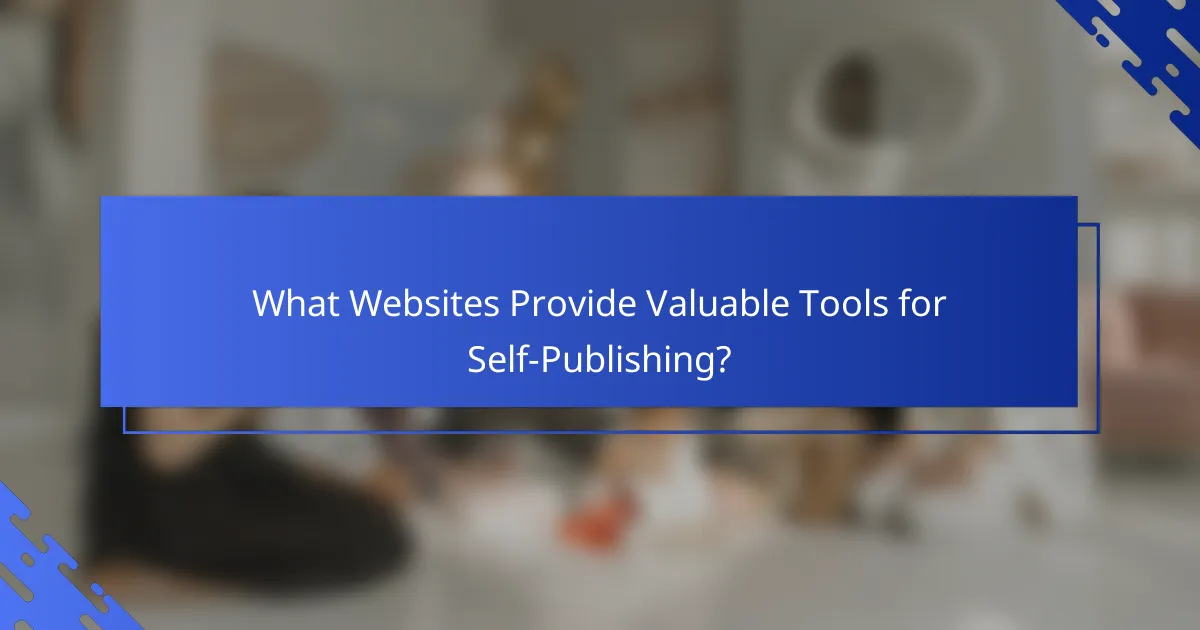
What Websites Provide Valuable Tools for Self-Publishing?
Numerous websites offer essential tools for self-publishing authors, helping them navigate the complexities of publishing and marketing their work. These resources include platforms for publishing, communities for support, and blogs with valuable insights.
Self-Publishing Platforms
Self-publishing platforms are online services that allow authors to publish their books independently. Popular options include Amazon Kindle Direct Publishing (KDP), IngramSpark, and Smashwords, each offering different features and distribution channels.
When choosing a platform, consider factors such as royalty rates, ease of use, and available formats. For example, KDP provides high royalties but is primarily focused on eBooks, while IngramSpark offers extensive print distribution options.
Online Communities for Authors
Online communities provide invaluable support and resources for self-publishing authors. Websites like Goodreads, Wattpad, and various Facebook groups allow authors to connect, share experiences, and gain feedback on their work.
Engaging in these communities can help authors learn from others’ successes and challenges. It’s beneficial to participate actively, ask questions, and share insights, as this can lead to networking opportunities and potential collaborations.
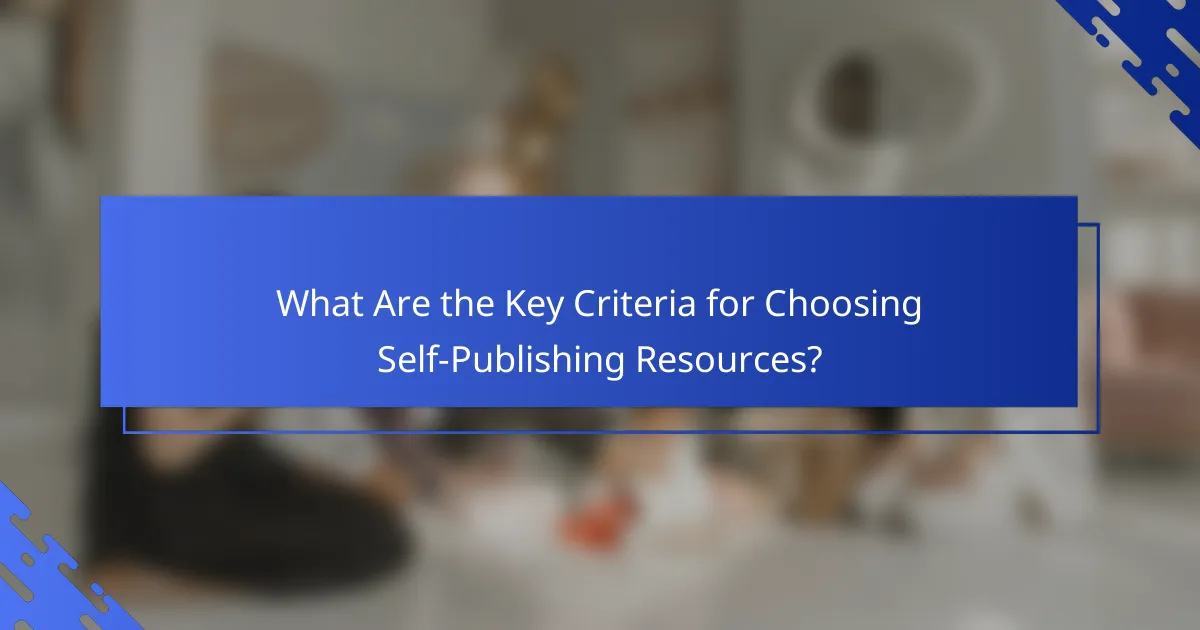
What Are the Key Criteria for Choosing Self-Publishing Resources?
When selecting self-publishing resources, prioritize credibility, relevance, and practical applicability. Look for materials that are well-reviewed, authored by industry experts, and tailored to the specific needs of self-publishing authors.
Evaluating Resource Credibility
To assess the credibility of self-publishing resources, consider the author’s background and experience in the publishing industry. Resources created by established authors or publishing professionals typically offer more reliable insights.
Check for reviews and testimonials from other authors who have used the resource. A resource with positive feedback from a diverse group of users is often a good indicator of its value and reliability.
Identifying Author-Focused Content
Look for resources that specifically address the challenges and needs of self-publishing authors. This includes guides on formatting, marketing strategies, and distribution channels that are relevant to independent authors.
Resources should provide actionable advice and practical examples that authors can implement. For instance, a blog that offers step-by-step tutorials on using Amazon KDP or insights on social media marketing can be particularly beneficial.
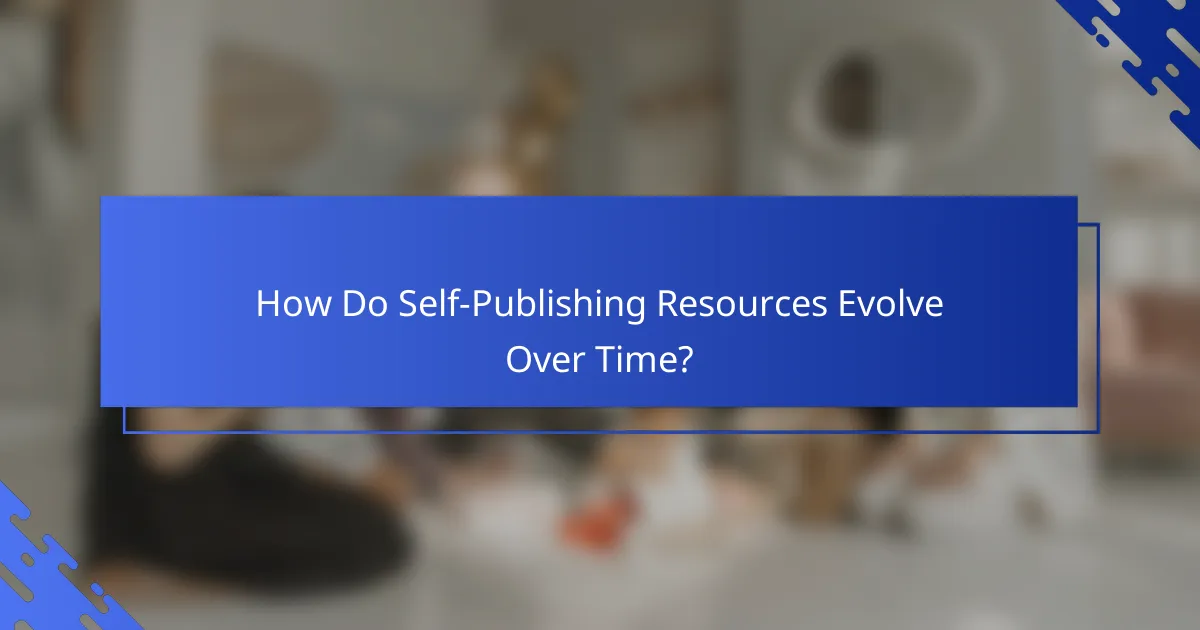
How Do Self-Publishing Resources Evolve Over Time?
Self-publishing resources continuously adapt to changes in technology, market demands, and author needs. As new platforms and tools emerge, authors gain access to more diverse and effective ways to publish and promote their work.
Trends in Self-Publishing Resources
Recent trends in self-publishing resources include the rise of hybrid publishing models and the increasing importance of digital marketing strategies. Authors are now leveraging social media platforms and email marketing to build their readership and promote their books.
Additionally, many self-publishing authors are turning to crowdfunding platforms to finance their projects, allowing them to gauge interest and secure funding before publication. This trend highlights the shift towards community engagement and direct author-reader interaction.
Impact of Technology on Self-Publishing
Technology has dramatically transformed the self-publishing landscape by providing authors with tools for easier formatting, distribution, and marketing. Platforms like Amazon Kindle Direct Publishing and IngramSpark have streamlined the publishing process, enabling authors to publish their work in both digital and print formats with minimal upfront costs.
Moreover, advancements in data analytics allow authors to track sales and reader engagement more effectively. This data-driven approach helps authors make informed decisions about marketing strategies and pricing, ultimately enhancing their chances of success in a competitive market.
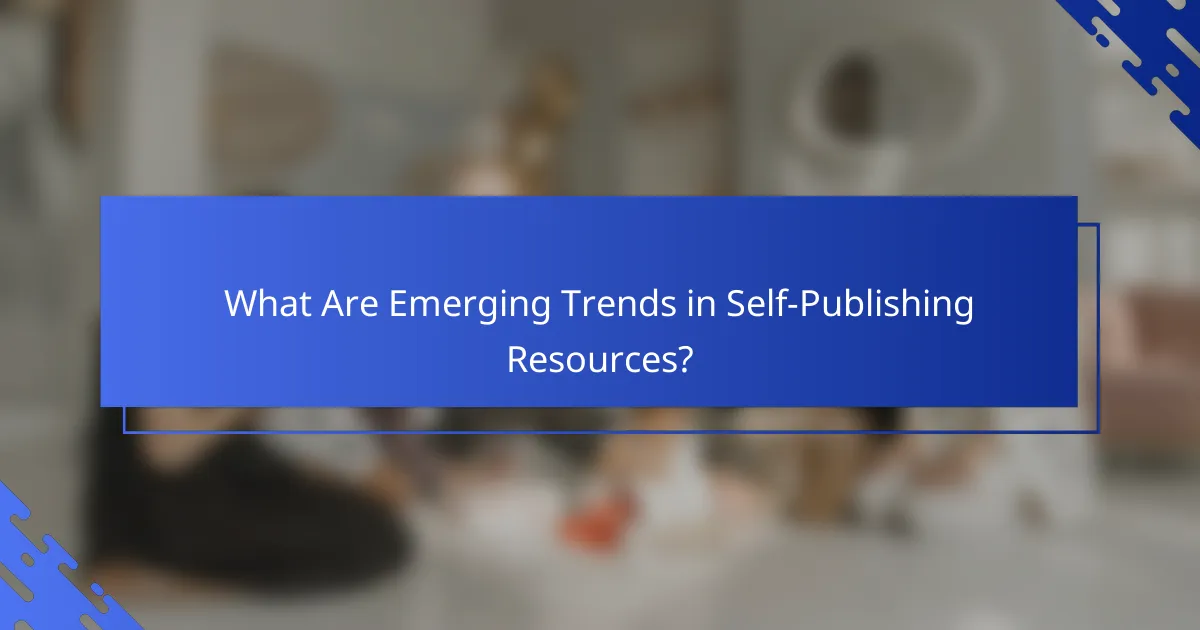
What Are Emerging Trends in Self-Publishing Resources?
Emerging trends in self-publishing resources reflect the evolving landscape of how authors create, promote, and distribute their work. Key developments include the rise of audiobooks and podcasts, increased use of social media for marketing, and advancements in self-publishing platforms.
Growth of Audiobooks and Podcasts
The popularity of audiobooks and podcasts is reshaping how authors reach their audiences. Many readers now prefer listening over reading, making audiobooks a lucrative option for self-published authors. Platforms like Audible and Apple Books provide easy access to a wide range of titles.
Authors can also create podcasts to discuss their books, share writing tips, or engage with their audience. This dual approach not only diversifies income streams but also builds a loyal listener base. Consider using services like Anchor or Libsyn to host and distribute your podcast.
Use of Social Media for Author Promotion
Social media has become a crucial tool for self-published authors to promote their work and connect with readers. Platforms like Instagram, Twitter, and TikTok allow authors to share snippets of their writing, engage with fans, and participate in writing communities. Utilizing hashtags relevant to your genre can significantly increase visibility.
Creating a content calendar can help maintain a consistent online presence. Focus on sharing engaging content, such as behind-the-scenes looks at your writing process or interactive Q&A sessions. Avoid spamming followers with constant promotions; instead, aim for a balance of promotional and personal content.
Future of Self-Publishing Platforms
The future of self-publishing platforms looks promising, with continuous improvements in technology and user experience. Services like Kindle Direct Publishing (KDP) and IngramSpark are evolving to offer more features, such as enhanced distribution options and better royalty structures. Authors should stay informed about these changes to maximize their reach.
As competition increases, authors may benefit from exploring niche platforms that cater to specific genres or audiences. Researching user reviews and comparing features can help in selecting the right platform for your needs. Always consider the terms of service and royalty rates before committing to a platform.
